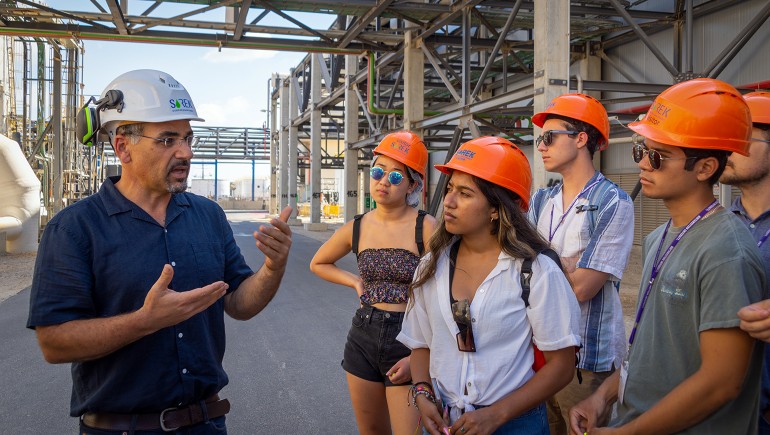Israel is one of the world’s most forward-looking countries when it comes to water management, which is why 16 Northwestern students toured the country in September to learn how it has coped with a hotter, dryer world, and to glean strategies for the future.
Representing schools and disciplines from across Northwestern, the students on the Global Engineering Trek (GET) Water-Israel met with leading researchers and industry experts to study Israel’s water infrastructure firsthand.
The trip was organized by Northwestern’s Israel Innovation Project (IIP) and the Center for Water Research, and co-sponsored by the McCormick School of Engineering’s Global Initiatives program and the Institute for Sustainability and Energy at Northwestern (ISEN)
“It’s been a really exciting opportunity,” said Aidan Ocampo, an Earth and planetary science major. “I’ve been very impressed with what Israel has accomplished through its water technology. There are a lot of valuable implications for what we can do in America and other parts of the world.”
Observing processes circular in nature
A mere 14 years after its government sounded the alarm on a growing water crisis, Israel is moving rapidly toward a sustainable water future. The country now draws and desalinates 75 percent of its drinking water from the Mediterranean Sea. And where the US reclaims just 4 percent of its wastewater for agricultural purposes, Israel repurposes nearly 90 percent.
Molly Whalen, who is studying industrial engineering and cognitive science, was struck by that discrepancy. “The U.S. is so far behind in terms of wastewater reuse and desalination,” she observed. “In Israel, it’s clear that they need to be more forward-thinking. But in the U.S., we seem to have so much water — right now, anyway — that we haven’t needed to think that way.”
Israel also repurposes the “waste” in its wastewater treatment process, using the exuded methane gas to fuel its treatment facilities and the treated sewage to fertilize its crops.
“I didn’t know it was possible to re-use so much” of those byproducts, Whalen said after a tour of the Shafdan treatment plant. “I was really struck by the circular nature of their processes.”



